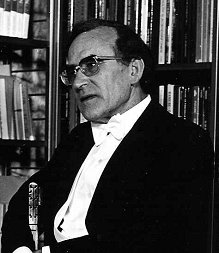
Thank you ...
Special thanks to our new principal Corporate Sponsor DPS Engineering who are committed to the Choir for three years commencing January 2016, and also to our new Corporate Partner Spirit Motor Group.

To be announced ...
The next concert will be announced soon.

Victor Leeson : 1920-1986

Victor Leeson
Victor Leeson founded the Guinness Choir in 1951, and was its Musical Director until 1984. The following obituary was published in the King's Hospital Newsletter, September 1986.
Victor Leeson's funeral took place from All Saints Church, Grangegorman on February 24th, 1986. The church was crowded and the Service took the form of a Solemn Eucharist. There was no music. Later a Memorial Mass was celebrated in John's Lane Church, Thomas Street. At this, there was much music, contributed by The Guinness Choir and soloists from it. On both occasions the congregation, made up of the many strands of the Christian tradition, took a full part in the liturgy and received Communion. This, in many ways, was a tribute to Victor's influence on us; the liturgy, worship and music all combined to radiate his own life and this worked miracles of understanding and joy in those with whom he came in contact.
Influences of light and mystery were upon him at an early age. Starting his education at The Kildare Place Primary schools and creeping home to Pembroke Street, he often felt the need to enter the Marist Oratory in Leeson Street to light a few candles. The puritan tradition prevented him from making any offering!
In 1933 he entered KH and soon came under the influence of George (Daddy) Harrison, continuing his piano and organ studies throughout his time in school. His interest in literature began, and some people still re-read and treasure essays which he wrote during his schooldays. In 1938 he was the one who discovered the fire in the Board Room ceiling in Blackhall Place and rushed to the scene bearing fire extinguishers.
Leaving school, his musical studies continued at the Leinster School of Music. Registering as a student in TCD, he sang Choral but left when he was called to the Brewery in 1940. At the same time, he was appointed organist to Saint Aidan's, Drumcondra Road, where he played until he moved to All Saints, Grangegorman as Organist and Choirmaster in 1944.
The inception of The King's Hospital Society saw his return to play in The Pirates of Penzance, and throughout the history of that Society he continue to play leads. This led to similar appearances for the R & R Musical Society at the Gaiety Theatre. However, his great musical talents were concentrated on All Saints where the choir was successfully trained in Gregorian Plain Chant to the words of the C of I Psalter. He gave solo organ recitals which entailed a month's early morning practice before going to work. Musical activity in Guinness began to burgeon – first with a ladies choir, then the training of a corps of young male singers. In 1951 The Guinness Musical Society was founded. Initially stage offerings were produced but soon this changed and the Society turned its activities to choral singing. Victor re-edited the score and made a new translation of Haydn's The Creation, transcribing the whole score in manuscript which was then copied for the whole choir. This mammoth task led to further effort and a move from the Rupert Guinness Hall to the SFX Hall for the first full performance in living memory of Bach's St Matthew Passion.
The choir undertook competition singing with great success both in Cork and Llangollen. In later times, the National Concert Hall was opened, and it is at this venue that the choir continues to give its successful concerts. All this musical activity was a direct result of Victor's drive, commitment and irascible enthusiasm.
The musical life was not all. Outdoors Victor was an enthusiastic mountaineer. Yearly month long camping holidays both in North Wales and in the West of Ireland introduced his many friends to the exigencies of severe mountain walking, his good capacity for cooking on primus stoves, and the delight of singing part songs by candlelight under soaking canvas.
In later years, Victor became an avid collector (and reader) of books. His interests ranged over history, religion and English literature, and resulted in the amassing an extensive library. He brought a widening of interest in many subjects to the entire Irish public. They, and more especially his very many friends, are most grateful and happy that we were so influenced for good by his deeds.
While compiling these notes I have listened to a Mozart Motet familiar from a performance given many years ago, and I think its title may give us all a suitable motto to remember Victor by - EXULTATE JUBILATE.